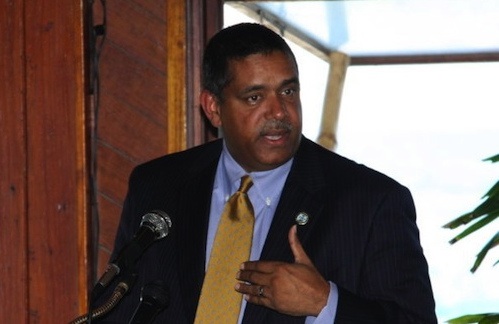Above: US Virgin Islands Governor John de Jongh
By the Caribbean Journal staff
United States Virgin Islands Governor John de Jongh has signed on to a letter urging US leaders to prevent the looming “fiscal cliff.”
The letter was addressed to President Barack Obama, Senate Majority and Minority Leaders Harry Reid and Mitch McConnell and House Majority and Minority Leaders John Boehner and Nancy Pelosi.
“We are extremely concerned about the unnecessary damage that would be inflicted on our economy by a failure to agree on a balanced approach to avoid the “fiscal cliff.” Reputable economists agree that the combination of deep and severe cuts to national priorities, from education to security to research and innovation, and tax increases on the middle-class would drive our country into a second recession. We cannot cut our way to greater prosperity and faster job creation. Therefore, we urge you to work together on a balanced solution.”
The governors asked that US leaders “immediately act” on legislation to extend tax cuts for families making less than $250,000. The US Senate has already passed the bill.
“Most economists agree that raising taxes on the middle class and those aspiring to join the middle class would be a damaging blow to consumer confidence,” the letter said. “According to a recent report issued by the President’s Council of Economic Advisers and the National Economic Council, consumer spending, a driving force of our economy, would be reduced by $200 billion in 2013 if Congress allows the middle class tax cuts to expire. So we call on Congress and the President to responsibly avoid the “fiscal cliff” by adopting a fair and balanced approach that includes the immediate extension of the tax cuts for the middle-class.”
The letter was signed by 11 Democratic governors, including de Jongh.
“We urge all sides to work together to put our federal fiscal house in order. That is why we support a balanced plan that has growing bipartisan support,” the governors wrote. “This plan would reduce the deficit by asking the highest-income earners to pay a little more and implement reasonable spending cuts that will not target the most vulnerable in our communities.”
